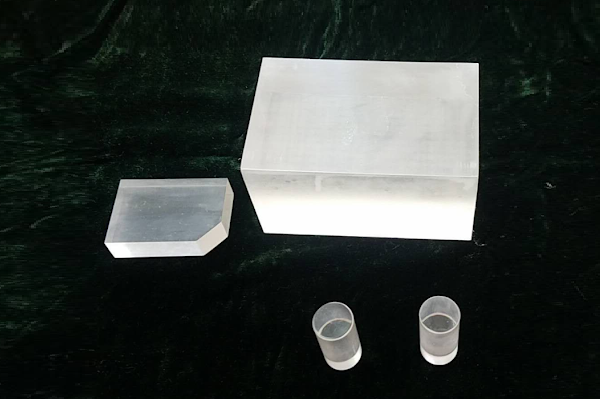Scintillation Crystals and Detectors: CsI (Na)
Scintillation Crystals and Detectors: CsI (Na)
Description

CsI (Na) is a type of scintillation crystal that is commonly used in radiation detection applications such as nuclear medicine and high-energy physics experiments. CsI (Na) is composed of cesium iodide (CsI) doped with sodium (Na) to improve its scintillation properties.
When ionizing radiation interacts with the crystal, it produces charged particles that excite the atoms within the crystal lattice. As these atoms return to their ground state, they emit light in the form of photons, which can be detected by a photodetector and converted into an electrical signal. The intensity of the light produced is proportional to the energy of the incident radiation, allowing for quantitative measurements of radiation intensity.
CsI (Na) has several advantages over other scintillation materials, including high light output, high stopping power for gamma rays, and good energy resolution. However, it is also relatively hygroscopic, meaning it can absorb moisture from the air, which can degrade its performance over time. Therefore, CsI (Na) crystals are typically housed in hermetically sealed containers to protect them from moisture.
| Properties/crystal | CsI (Na) |
| Crystal structure | cubic |
| Lattice constant( Å ) | - |
| Melting point, °C | 894 |
| Density, g/cm3 | 4.51 |
| Mohn hardness | 2 |
| Thermal expansion, 10-6/K | 49 |
| Refractive index | 1.84 |
| Emission wavelength (nm ) | 420 |
| Decay constant (ns ) | 630 |
| Radiation length (cm ) | - |
| Hygroscopic | yes |
| Afterglow % at 6ms | 0.5 - 5.0 |
| Effective atomic number | 54 |
| Light yield [photons/MeVy] | (35 - 42) x 103 |
| Background, pulse/sec/kg | < 3.0 |
| Crystal cleavage plane | none |
Order Form
About Semiconductor Electronics
SEMI EL project is a global supplier of materials, equipment, spare parts and supplies for the semiconductor industry.
Get In Touch
Email: info@semi-el.com

